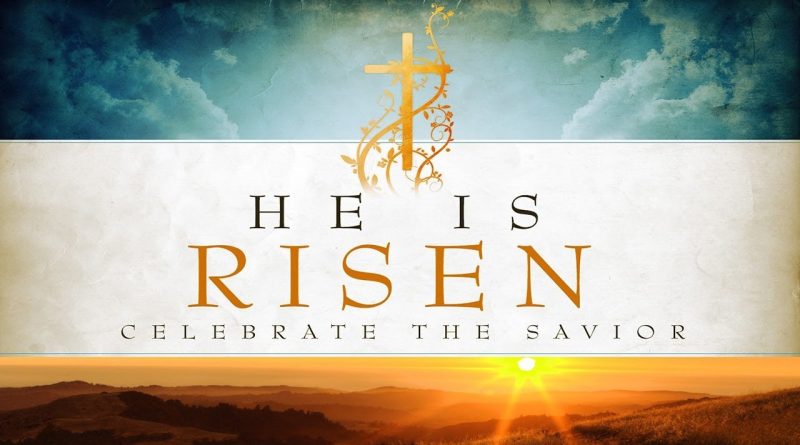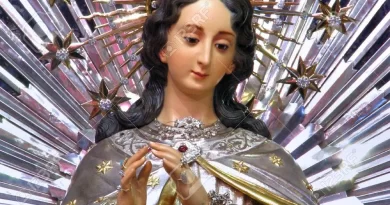The Mystery of Easter through the lens of the Fathers of the Church
Christ is risen! Indeed, He is Risen! Our Orthodox brothers and sisters would say: Christos Anesti! and the immediate reply would be Alithos Anesti!
Yes! Christ has been Risen! The Bible is replete with this foundational truth about Christ’s victory over sin and death. Here are some of the numerous quotes which speak about this basic truth of our faith: For we know that Christ being raised from the dead will never die again; death no longer has dominion over him (Rom 6:9). And God raised the Lord and will also raise us up by his power (1 Cor 6:14). And killed the Author of life, whom God raised from the dead. To this we are witnesses (Acts 3:15). Jesus said to her (Martha), “I am the resurrection and the life; he who believes in me, though he die, yet shall he live, and whoever lives and believes in me shall never die. Do you believe this?” (John 11:25-26). But the angel said to the women, “Do not be afraid; for I know that you seek Jesus who was crucified. He is not here; for he has risen, as he said. Come, see the place where he lay” (Matt 28:5-6).
As I have said already, these are some of the many biblical quotes which point to Christ’s Resurrection from the dead. Imagine now how the Fathers of the Church were so much familiar with them and let them inspire them in their catechetical, homiletical and theological enterprise.
Pope St Clement of Rome sees the Resurrection of Jesus as essentially marking creation. In effect, creation works through the power of the Resurrection of Jesus Christ. In First Clement, 24, 27, 42), he writes:
Day and night declare to us a resurrection. The night sinks to sleep, and the day arises; the day again departs, and the night comes on. Let us behold the fruits of the earth, how the sowing of grain takes place. The sower goes forth, and casts it into the ground; and the seed being thus scattered, though dry and naked when it fell upon the earth, is gradually dissolved. Then out of its dissolution the mighty power of the providence of the Lord raises it up again, and from one seed many arise and bring forth fruit….Having then this hope, let our souls be bound to Him who is faithful in His promises, and just in His judgments. He who has commanded us not to lie, shall much more Himself not lie…The apostles have preached the Gospel to us from the Lord Jesus Christ; Jesus Christ has done so from God. Christ therefore was sent forth by God, and the apostles by Christ. Both these appointments, then, were made in an orderly way, according to the will of God. Having therefore received their orders, and being fully assured by the resurrection of our Lord Jesus Christ, and established in the word of God, with full assurance of the Holy Ghost, they went forth proclaiming that the kingdom of God was at hand.
In his Dialogue with Trypho, St Justin sees the Resurrection of Jesus as the missionary rule to evangelize the Jewish people that Christ is indeed the Son of God.
And though all the men of your nation knew the incidents in the life of Jonah, and though Christ said amongst you that He would give the sign of Jonah, exhorting you to repent of your wicked deeds at least after He rose again from the dead, and to mourn before God as did the Ninevites, in order that your nation and city might not be taken and destroyed, as they have been destroyed; yet you not only have not repented, after you learned that He rose from the dead, but, as I said before you have sent chosen and ordained men throughout all the world to proclaim that a godless and lawless heresy had sprung from one Jesus, a Galilaean deceiver, whom we crucified, but his disciples stole him by night from the tomb, where he was laid when unfastened from the cross, and now deceive men by asserting that he has risen from the dead and ascended to heaven. Moreover, you accuse Him of having taught those godless, lawless, and unholy doctrines which you mention to the condemnation of those who confess Him to be Christ, and a Teacher from and Son of God. Besides this, even when your city is captured, and your land ravaged, you do not repent, but dare to utter imprecations on Him and all who believe in Him. Yet we do not hate you or those who, by your means, have conceived such prejudices against us; but we pray that even now all of you may repent and obtain mercy from God, the compassionate and long-suffering Father of all.” (Dialogue With Trypho, 108).
With St John Chrysostom, preaching of course in the fifth century, we are exhorted, even those who did not keep the Lenten fast, to rejoice and participate in the great solemnity of Christ’s resurrection from the dead.
Let all Pious men and all lovers of God rejoice in the splendor of this feast; let the wise servants blissfully enter into the joy of their Lord; let those who have borne the burden of Lent now receive their pay, and those who have toiled since the first hour, let them now receive their due reward. Let any who came after the third hour be grateful to join in the feast, and those who may have come after the sixth, let them not be afraid of being too late. For the Lord is gracious and He receives the last even as the first. He gives rest to him who comes on the eleventh hour as well as to him who has toiled since the first. Yes, He has pity on the last and He serves the first. He rewards the one and is generous to the other. He repays the deed and praises the effort. Come you all: enter into the joy of your Lord. You the first and you the last, receive alike your reward. You rich and you poor, dance together. You sober and you weaklings, celebrate the day. You who have kept the fast and you who have not, rejoice today. The table is richly loaded: enjoy its royal banquet. The calf is a fatted one: let no one go away hungry. All of you enjoy the banquet of faith! All of you receive the riches of his goodness! Let no one grieve over his poverty, for the universal kingdom has been revealed. Let no one weep over his sins, for pardon has shone from the grave. Let no one fear death, for the death of our Savior has set us free. He has destroyed it by enduring it. He has despoiled Hades by going down into its kingdom. He has angered it by allowing it to taste of his flesh.
When Isaiah foresaw all this, he cried out: “O Hades, you have been angered by encountering Him in the nether world.” Hades is angered because it is frustrated, it is angered because it has been mocked, it is angered because it has been destroyed, it is angered because it has been reduced to naught, it is angered because it is now captive. It seized a body, and lo! it discovered God. It seized earth, and, behold! it encountered heaven. It seized the visible, and was overcome by the invisible.
O death, where is your sting? O Hades, where is your victory? Christ is risen and life is freed! Christ is risen and the tomb is emptied of the dead! For Christ, being risen from the dead, has become the Leader and Reviver of those who had fallen asleep.
To Him be glory and power for ever and ever. Amen.
The natural consequence of Christ’s Resurrection is that we too shall be resurrected. Speaking in the first person singular, St Ignatius of Antioch saw this already happening as he was taken to be martyred. In his Letter to the Romans he wrote:
“I am the wheat of God, and let me be ground by the teeth of the wild beasts, that I may be found the pure bread of Christ. Rather entice the wild beasts, that they may become my tomb, and may leave nothing of my body; so that when I have fallen asleep in death, I may be no trouble to any one. Then shall I truly be a disciple of Christ, when the world shall not see so much as my body. Entreat Christ for me, that by these instruments I may be found a sacrifice to God. I do not, as Peter and Paul, issue commandments unto you. They were apostles; I am but a condemned man: they were free, while I am, even until now, a servant. But when I suffer, I shall be the freed-man of Jesus, and shall rise again emancipated in Him” (Ignatius of Antioch, Letter To The Romans, 4).
In this simple appreciation of the Church’s Fathers contribution on Christ’s Resurrection, the mystery of Easter is a feast to be celebrated by everyone. In fact, it becomes so central that it touches not simply the lives of all the people but also that of creation. Hence, one can then understand why it becomes the rule of the Church’s missionary activity around the world.
Fr Mario Attard OFM Cap





